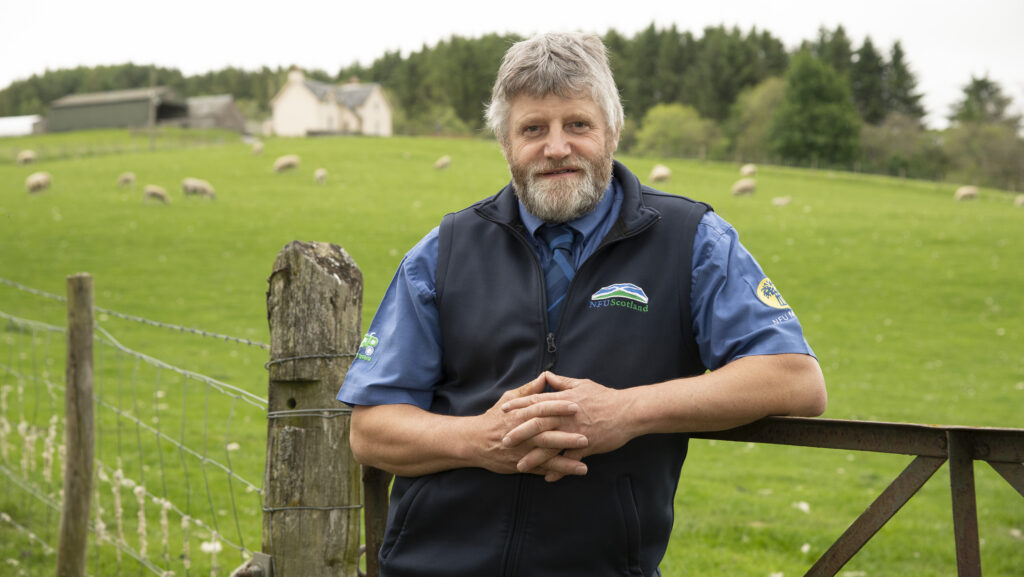NFU Scotland seeks funding pledge in landmark bill
 Martin Kennedy © NFU Scotland
Martin Kennedy © NFU Scotland A funding commitment must be added to the upcoming Agriculture Bill to help secure a “sustainable and profitable” future for Scottish farmers and crofters, NFU Scotland has insisted.
The Scottish government’s landmark Agriculture and Rural Communities (Scotland) Bill aims to give ministers powers to support farming and rural communities in the post common agricultural policy (CAP) era.
The bill has now reached Stage 3 and is due to be completed before parliamentary recess at the end of June.
See also: Time for ‘policy reset’ as SNP and Scottish Greens part ways
Hundreds of proposed amendments were considered at Committee level at Stage 2, with NFU Scotland (NFUS) heavily involved, and a revised bill has since been published which will go forward to the Scottish Parliament.
This means that a crucial Scottish parliamentary debate and vote on the bill will potentially overlap with the Royal Highland Show from 20-23 June.
‘Positive talks’
NFUS president Martin Kennedy said union representatives held a “positive and constructive” meeting with cabinet secretary for rural affairs, land reform and islands Mairi Gougeon MSP at the end of May.
“We discussed the bill, potential amendments that may come through in the final stages and underlined our call for a funding commitment from Scottish government to be included on the face of the bill,” Mr Kennedy told Farmers Weekly.
“Securing an Agriculture and Rural Communities (Scotland) Bill that delivers a sustainable and profitable future for Scottish farmers and crofters remains NFU Scotland’s primary focus.
“And we are now entering the end game.”
Basic Payment Scheme (BPS) payments in Scotland will be unchanged for 2025, although new conditionality will be introduced in anticipation of the new scheme.
The Scottish government plans to end BPS payments in 2026 and introduce a new four-tier support scheme in 2027.
This will see funding split across four tiers, with at least 70% paid to farmers directly in tiers 1 and 2.
Tiers 3 and 4 will pay farmers for targeted actions for climate change and nature restoration, such as tree planting, creating wetlands or restoring peatlands.
The bill places upon ministers a duty to prepare, lay before parliament, and publish a Rural Support Plan.
This plan will explain how the Scottish government’s tiered support will fulfil its Vision for Agriculture and how it will support food production in ways that contribute to nature restoration and climate adaptation and mitigation.
Farmers ‘left in the dark’
Scottish Conservative shadow rural affairs secretary Rachael Hamilton MSP accused the ruling SNP government of leaving farmers, crofters and the wider agriculture sector “in the dark” over what future funding support will look like.
“Successive SNP rural affairs ministers have had the opportunity to provide that clarity, and they cannot get their Agriculture Bill wrong,” she added.
A spokesperson for the Scottish government said it was unable to comment on the bill due to the proximity of the general election.
However, Farmers Weekly understands the Scottish government will insist rural Scotland must not suffer any funding decrease as a result of Brexit and decisions made by UK government.
Budget tops agenda in union’s election manifesto
Bolstering the future budget for UK agriculture by an extra £1bn, and improving Scotland’s share of it are top of NFU Scotland’s wish-list as it considers the prospect of a change of government in Westminster.
NFU Scotland (NFUS) published its manifesto in April, a month before prime minister Rishi Sunak declared the general election for 4 July. It contains 18 specific asks of government across a range of topics, but none more important than those relating to budget.
“The funding provided by the next UK government will be critical to Scottish agriculture’s ability to help meet UK-wide objectives relating to climate mitigation and adaptation, nature enhancement and food production,” says the NFUS manifesto.
As well as a 27% rise in UK rural support to £4.7bn, NFUS is demanding that the budget is ring-fenced and “multi-annual” from 2025-2029, and that the regional allocation should “better reflect that Scotland punches above its weight in delivering for food, climate and biodiversity”.
Scottish government’s agricultural support budget consisted of £485m in Pillar 1 payments (direct payments to farmers) and around £130m in Pillar 2 payments (rural development payments) in 2023-24.
NFUS president Martin Kennedy said that while most policy, legislation and regulation on Scottish agriculture is devolved to Holyrood, fundamental issues such as trade, migration and internal market issues are reserved to the UK government.
“Top of the list is the fundamental need to deliver increased, ring-fenced and multi-annual funding,” he added.
Other key manifesto demands include strengthening farmers’ negotiating positions with buyers, deliver a suitable migration policy, changing the tax system to encourage longer letting of land and investment, and establishing core production standards for all agri-food imports.
